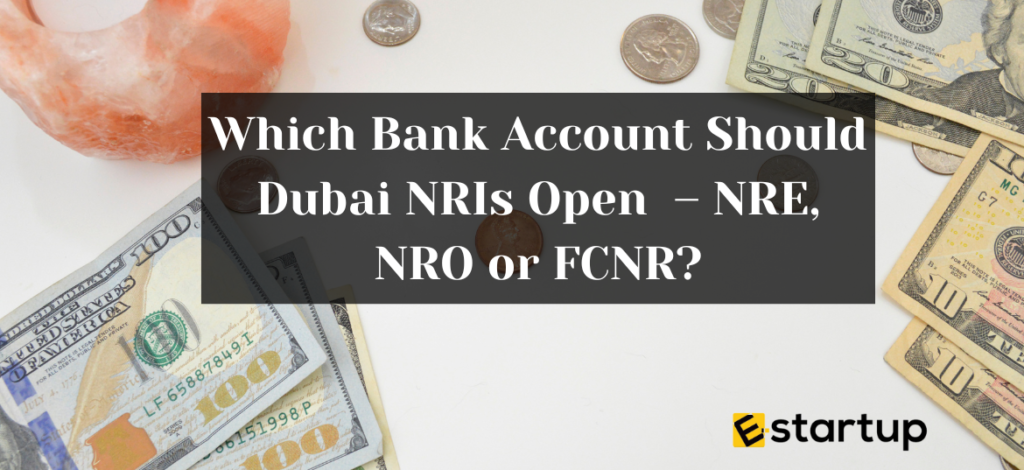Every Indian working in Dubai, sending money home is a priority. Whether it’s supporting family, investing in real estate, or saving for retirement, NRIs depend on Indian banks to manage their finances.
But most NRIs don’t understand the difference between NRE, NRO, and FCNR accounts .They end up depositing money in the wrong account, paying unnecessary taxes, or struggling to repatriate funds back to Dubai.
If you’re a Dubai NRI, this blog is your complete guide to choosing the right bank account, saving tax, and ensuring compliance with Indian and UAE laws .
Why do NRIs in Dubai Require Special Bank Accounts?
Once you become an NRI according to Indian tax regulations (staying outside India for 182+ days a year), your Indian resident savings account is no longer valid. RBI regulations require that you convert it into an NRE, NRO, or FCNR account .
They are specially created for:
- Handling income earned in India (rent, dividend, pensions).
- Saving and investing Dubai foreign income.
- Smooth repatriation of money between UAE and India.
- Double taxation avoidance with the right structures.
1. NRE Account (Non-Resident External)
Ideal for: Foreign income, salary in Dubai, savings in India
An NRE account is your tax-free gateway to India.
Features:
- Only foreign currency deposits are accepted (your Dubai salary).
- Converted and held in Indian Rupees (INR).
- Interest rate ~6–7%
- Repatriable (you can repatriate principal and interest back to Dubai at any time).
Taxation:
- Zero tax in India.
- No gift tax or wealth tax.
Tip: Keep your UAE income separate and use NRE at all times. Never mix it with your Indian income.
2. NRO Account (Non-Resident Ordinary)
Best for: Indian income (rent, dividends, pensions, business profits)
An NRO account is your compliance account to deal with earnings earned within India.
Features:
- Held in INR.
- Can be jointly owned by another NRI or a resident Indian.
- Interest rate ~3–4% (less than NRE).
Taxation:
- Interest is taxable in India at 30% TDS + cess.
- DTAA (Double Taxation Avoidance Agreement) can minimize this tax for UAE residents.
- For instance, under the India-UAE DTAA, interest can be taxed at the lower rate of ~10%.
Read about India UAE DTAA here
Repatriation:
Restricted repatriation: up to USD 1 million per financial year with due documentation (Form 15CA/15CB of a CA).
Tip: Utilize NRO exclusively for Indian income. Don’t credit your Dubai salary in this account; it will be taxed in India.
3. FCNR Account (Foreign Currency Non-Resident)
Ideal for: Foreign currency deposits & INR depreciation cover
FCNR account is similar to a fixed deposit in India, but in foreign currency.
Features:
- Currencies accepted: USD, GBP, EUR, JPY, AUD, AED, etc.
- Tenure: 1–5 years.
- Principal + interest fully repatriable.
- Perfect for people who do not wish to take exchange rate risk.
Tip: : Use FCNR FDs as a hedge if you expect INR depreciation.
Steps to Apply for NRE, NRO & FCNR Accounts
Step 1: Select Account Type
- NRE → Dubai salary/foreign income (tax-free).
- NRO → Indian income such as rent/dividends (taxable).
- FCNR → Foreign currency FDs (safe & tax-free).
Step 2: Select a Bank
- Popular banks: SBI, HDFC, ICICI, Axis, Kotak.
- Most have NRI branches/desks in Dubai.
Step 3: Prepare Documents
- Passport and valid UAE visa
- Emirates ID / proof of Dubai address
- PAN card (compulsory for NRO)
- Proof of Indian address (if any)
- Passport photos
Step 4: Submit Application
- Apply online or at the Dubai/India branch.
- Documents require attestation (Embassy/Consulate/Notary).
Step 5: Verification & Funding
- Bank completes KYC.
- Fund your account through remittance (NRE/FCNR) or Indian income (NRO).
Common Mistakes NRIs Make
- Keeping a resident savings account active is illegal under FEMA.
- Dubai salary parking in NRO accounts is unnecessarily making it taxable.
- ignoring DTAA relief is losing money to excessive TDS.
- Failure to file ITR in India is a compliance risk.
Government of India – FEMA Regulations for NRIs – https://dea.gov.in/
Final Word
Being an NRI in Dubai has its perks — no income tax in the UAE and several banking options in India. But the proper selection of NRE, NRO, and FCNR accounts can assist you:
- Save tax in India.
- Maintain Dubai and Indian incomes separately.
- Facilitate smooth and lawful repatriation of funds.
By properly utilizing these three accounts, you can save your money, reduce tax burdens, and transfer money from India to Dubai or vice versa with ease.
Confused about which account suits you best? Our team E-Startup will help you open NRE, NRO, or FCNR accounts hassle-free.
FAQs
1. Can Dubai NRIs keep a normal savings account in India?
No. Once you become an NRI (staying outside India for 182+ days), you must convert your resident account into an NRE, NRO, or FCNR account as per RBI rules.
2. Which is better for Dubai salary – NRE or NRO account?
NRE account is the best for Dubai salary since it is tax-free in India and fully repatriable.
3. Is interest earned on NRE accounts taxable in India?
No. Both principal and interest in an NRE account are completely tax-free in India.
4. Can I deposit rent and dividends in my NRE account?
No. Indian income such as rent, dividends, or pensions must be deposited only in an NRO account.
5. What is the tax rate on NRO account interest for Dubai NRIs?
By default, it is 30% TDS + cess. But under the India–UAE DTAA, the rate can be reduced to ~10%.
6. How much money can I repatriate from my NRO account?
You can repatriate up to USD 1 million per financial year, subject to submitting Form 15CA/15CB certified by a CA.
7. What is the benefit of opening an FCNR account for Dubai NRIs?
It allows you to hold fixed deposits in foreign currency (USD, AED, GBP, etc.) and protects you from INR depreciation, while being tax-free in India.
8. Can I open these accounts while staying in Dubai?
Yes. Most banks like SBI, HDFC, ICICI, and Axis have NRI desks in Dubai, and you can apply online or through the branch with attested documents.
9. Do Dubai NRIs need a PAN card for opening NRE/NRO/FCNR accounts?
PAN is compulsory for NRO accounts (since they deal with taxable Indian income). For NRE/FCNR, PAN is not mandatory but highly recommended.
10. What happens if I don’t convert my resident account after becoming an NRI?
It becomes illegal under FEMA, and you may face penalties. Always convert your account to NRE, NRO, or FCNR once you qualify as an NRI.













